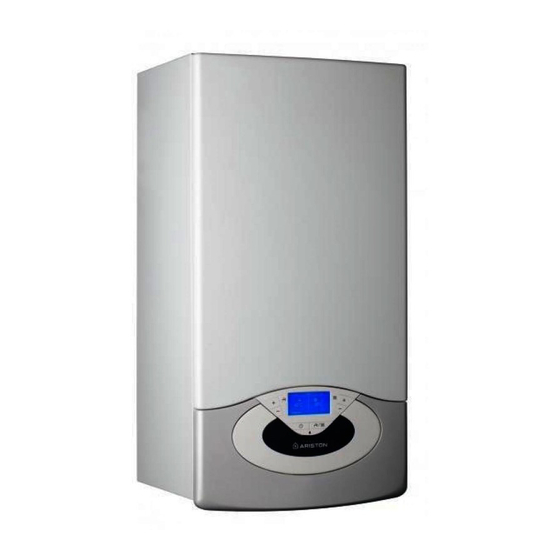Ariston GENUS PREMIUM EVO HP 100 Design, Installation And Servicing Instructions - Page 15
Browse online or download pdf Design, Installation And Servicing Instructions for Boiler Ariston GENUS PREMIUM EVO HP 100. Ariston GENUS PREMIUM EVO HP 100 44 pages. Wall-hung condensing
gas boiler hp
Also for Ariston GENUS PREMIUM EVO HP 100: User Manual (17 pages), User Manual (24 pages), User Manual (32 pages)

Warning!
It is advisable to install a suitably sized hydraulic separator
(available as an accessory) between the boiler circuit and the
heating circuit.
Warning!
It is advisable to install a fi lter on the system's return pipe to prevent
impurities or sludge from damaging the appliance.
It is mandatory to add this fi lter when replacing return pipes on
existing appliances.
The manufacturer shall not be held liable for any damages to the
appliance due to failure to install said fi lter.
Appliances with underfl oor heating
For appliances with underfl oor heating, fi t a safety thermostat onto
the underfl oor heating outlet. For the electrical connection of the
thermostat see the section on "Electrical connections".
If the outlet temperature is too high, the boiler will stop both
domestic hot water and the heating production and the error code
1 16 "underfl oor thermostat open" will appear on the display. The
boiler will restart when the thermostat is closed during automatic
resetting.
If the thermostat cannot be installed, the underfl oor heating
equipment must be protected by a thermostatic valve, or by a
bypass to prevent the fl oor from reaching too high a temperature.
System water characteristics
Water should be suitably treated when its hardness exceeds 25°
Fr, in order to avoid limescale from depositing in the boiler due
to hard water, or corrosion due to aggressive water. It is useful
pointing out that even deposits barely a few millimetres thick may
cause considerable overheating of the generator walls due to their
low thermal conductivity, thereby causing serious damage.
It is fundamental to treat water used in large-scale systems (i.e.
that use high volumes of water) or when the system is frequently
refi lled with water. In such cases, if the system is then partially or
totally drained, it must be refi lled using treated water again.
Indirect cylinder connection
The available kits allow for connecting the appliance to an external
indirect cylinder for the production of domestic hot water. The
boiler is already equipped for checking the indirect cylinder
temperature using the NTC sensor (see electrical diagram)
For more detailed information, please read the instruction sheet
supplied with the kits.
WARNING!!
If the appliance is used for heating only, the boiler version
parameter must be changed from Tank (1) to System (2) – menu
2/sub-menu 2/parameter 8.
Discharge of condensation
High energy effi ciency produces some condensation which must
be removed. To do so, use a plastic pipe placed so as to avoid the
accumulation of any condensation inside the boiler. This pipe must
be attached to a discharge siphon which can be checked when
required.
The standards governing installation currently in force in the
country of installation must be respected, as must any local
authority regulations or those issued by public health bodies.
Check the positioning of the condensate discharge tube:
- it must not be nipped when connected
- it must not form a swan's neck
- ensure that it is cleared using free air in the siphon
For the evacuation of condensates, use only pipes which satisfy the
relevant norms.
As the condensates are acid (pH close to 2), all necessary precautions
must be taken before any operation.
Before the fi rst time the equipment is used, the siphon
must be fi lled with water. To do this, add approximately
1/4 litre of water via the burnt gas outlet before fi tting
the discharge device, or unscrew the siphon positioned
underneath the boiler, fi ll it with water and refi t it
Warning! insuffi cient water in the siphon can cause the
fl ue gas to be expelled into the surrounding ambient air
installation
15
